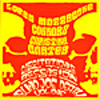Loren Mazzacane Connors/Christina Carter, "Meditations on the Ascension of Blind Joe Death Vol. One"
John Fahey was a master musician, completely redefining the guitar andpioneering several styles that are distinctly and wholly his own. BlindJoe Death was a name he ascribed to a few tracks on his first album ofthe same name. John Fahey is Blind Joe Death and, as the sleeve of thisrecord suggests, Blind Joe is still very much alive. Loren MazzacaneConnors and Christina Carter (along with artist Conrad Capistran andByron Coley) have composed the first in a proposed series of duorecordings dedicated to the memory and work of John Fahey.
Ecstatic Yod
The artworkis absolutely gorgeous, imitating the style of many of Fahey's recordcovers down to the small essays sometimes included on the back of hissleeves. The music, however, does not recall the material on Fahey's Blind Joe Deathrecords. Instead, Connors and Carter have opted to stick their guns andrecord the music as they know best. This undoubtedly works to theiradvantage as any attempt at copying Fahey's style on these recordswould be both redundant and futile. The record is broken into twoside-long pieces, each of which is broken into several parts. The firstside, entitled "Smoke," includes piano and a guitar whose tone iswhite, but distorted by some blanket, as though I'm only catchingechoes of the actual performance. The movement of both instruments isslow, cold, and somber, invoking Fahey's ghost in a series of drawn outtones and shadowy folds. The guitar playing, at times, is reminiscentof Fahey's latter work, but remains far less complex and more focusedon atmospheric effect. Haunting in its slow creep, the seven-part trackslowly fades away and leaves a feeling of complete emptiness andabsence; Fahey is obviously missed. The second side is entitled"Mirrors" and is broken into five pieces. The guitar and piano on thisside move with a certain grace that reminds me entirely of Faheywithout being an actual copy of his work. The mood is still solemn insome ways, but the instruments have more life in them and each notesomehow vibrates and harmonizes with Fahey's attitude and approachtowards music. The album ends with a sample of a recording from whatmight be an old 78 playing in the background. It simultaneously makesreference to Fahey's love for the history of blues and folk music andto Death himself, still responsible but unknown for so much greatmusic.

Ecstatic Yod
The artworkis absolutely gorgeous, imitating the style of many of Fahey's recordcovers down to the small essays sometimes included on the back of hissleeves. The music, however, does not recall the material on Fahey's Blind Joe Deathrecords. Instead, Connors and Carter have opted to stick their guns andrecord the music as they know best. This undoubtedly works to theiradvantage as any attempt at copying Fahey's style on these recordswould be both redundant and futile. The record is broken into twoside-long pieces, each of which is broken into several parts. The firstside, entitled "Smoke," includes piano and a guitar whose tone iswhite, but distorted by some blanket, as though I'm only catchingechoes of the actual performance. The movement of both instruments isslow, cold, and somber, invoking Fahey's ghost in a series of drawn outtones and shadowy folds. The guitar playing, at times, is reminiscentof Fahey's latter work, but remains far less complex and more focusedon atmospheric effect. Haunting in its slow creep, the seven-part trackslowly fades away and leaves a feeling of complete emptiness andabsence; Fahey is obviously missed. The second side is entitled"Mirrors" and is broken into five pieces. The guitar and piano on thisside move with a certain grace that reminds me entirely of Faheywithout being an actual copy of his work. The mood is still solemn insome ways, but the instruments have more life in them and each notesomehow vibrates and harmonizes with Fahey's attitude and approachtowards music. The album ends with a sample of a recording from whatmight be an old 78 playing in the background. It simultaneously makesreference to Fahey's love for the history of blues and folk music andto Death himself, still responsible but unknown for so much greatmusic.



